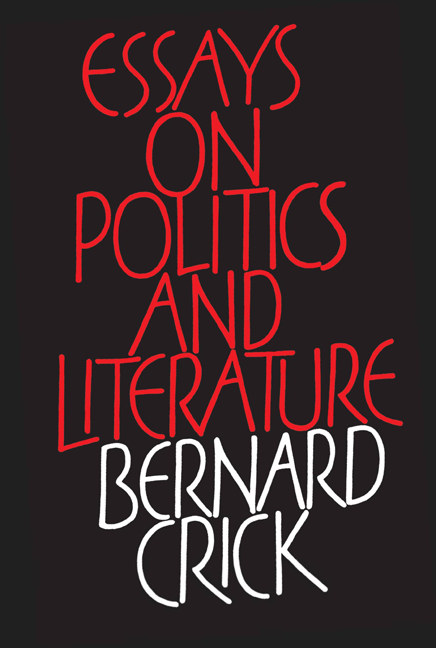Book contents
- Frontmatter
- Contents
- Preface
- Acknowledgements
- Foreword by David Daiches
- One Literature and Politics
- Two The Political in Britain’s Two National Theatres
- Three Young Writers of the Thirties
- Four Koestler’s Koestler
- Five Hannah Arendt: Hedgehog or Fox?
- Six Beatrice Webb as English Diarist
- Seven Words
- Eight My Lse
- Nine Reading The Observer as a Complex Text
- Ten On the Difficulties of Writing Biography and of Orwell’s in Particular
- Eleven Reading Nineteen Eighty-Four As Satire
- Twelve Animal Farm For Schools
- Thirteen Orwell and English Socialism
- Fourteen On the Orwell Trail
- Fifteen Wedekind’s Spring Awakening
- Sixteen Horvath’s Tales From the Vienna Woods
- Seventeen Pinter’s No Man's Land
- Eighteen Polly By Gaslight
- Nineteen Edgar Catches Jenkins’ Ear at the Barbican
- Twenty Barrault at the Barbican
- Index
Sixteen - Horvath’s Tales From the Vienna Woods
Published online by Cambridge University Press: 24 September 2020
- Frontmatter
- Contents
- Preface
- Acknowledgements
- Foreword by David Daiches
- One Literature and Politics
- Two The Political in Britain’s Two National Theatres
- Three Young Writers of the Thirties
- Four Koestler’s Koestler
- Five Hannah Arendt: Hedgehog or Fox?
- Six Beatrice Webb as English Diarist
- Seven Words
- Eight My Lse
- Nine Reading The Observer as a Complex Text
- Ten On the Difficulties of Writing Biography and of Orwell’s in Particular
- Eleven Reading Nineteen Eighty-Four As Satire
- Twelve Animal Farm For Schools
- Thirteen Orwell and English Socialism
- Fourteen On the Orwell Trail
- Fifteen Wedekind’s Spring Awakening
- Sixteen Horvath’s Tales From the Vienna Woods
- Seventeen Pinter’s No Man's Land
- Eighteen Polly By Gaslight
- Nineteen Edgar Catches Jenkins’ Ear at the Barbican
- Twenty Barrault at the Barbican
- Index
Summary
In a monthly periodical, the theatre critic can either get the best of both worlds or fall between two stools with a thud. If he writes for, as it were, a potential theatre-goer, seeking to influence before the event, then the plays that he can write about are limited to those likely to run for several months, hence to our two national theatres, that's to say, the National itself and the RSC at the Aldwych and in Stratford. So he misses both the excellence of theatre in the provinces (which one hopes the National will bring to London) and the stimulus of much of the short, lively and sometimes alternative in London (which one hopes the National will not kill with kindness, or socialise by offering them licensed happenings on the site). Could the marvellous short frolic that the Bush did just before Christmas, a version of Bill Tidy's Fosdyke Saga, spoofing committed proletarian theatre, have possibly survived the official embrace? (But if you missed it, five volumes have been published, funnier than Clive James so, no need to read The Daily Mirror daily or at all.) But a monthly does have a bit of precious time and space to keep a stern and serious eye on programmes, policies and actual developments of our major theatrical institutions, not just talk up or down a play. One thing the critic can do for an individual play in a monthly, however, is to take time to read the text, obviously a rare luxury for the daily and weekly professionals. And another odd thing he can do is read (a wicked liberty) those other fellows too—before he writes but only after he has been and seen.
Certainly the National's recent production of Odon von Horvath's Tales From the Vienna Woods proved an astonishing trap for and caused havoc among the professionals under pressure. For Horvath has never been performed before on a British stage. This play had its premiere in November 1931 in Berlin, earning some of the last free applause that was to be heard for many years.
In that same year, Carl Zuckmayer had presented Horvath withthe great Kleist Prize, perhaps the most prestigious of German literary awards, already held by Bertolt Brecht and Robert Musil.
- Type
- Chapter
- Information
- Essays on Politics and Literature , pp. 231 - 238Publisher: Edinburgh University PressPrint publication year: 2020

